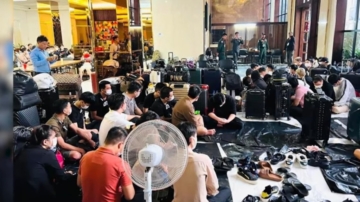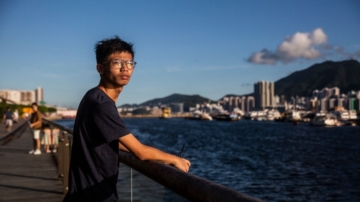【新唐人2013年05月24日訊】「英國廣播公司」《BBC》國際臺,委託民調公司進行的一項全球民意調查顯示,國際社會對中國的印象轉差,降到了8年來的最低點。評論認為,主要原因是隨著互聯網日益發達和中國民眾的意識覺醒,中共體制下,越來越多的醜聞在國際社會曝光,其中包括鎮壓信仰、人權﹔限制言論、媒體自由﹔暴力維穩、環境污染﹔以及中共內部大量官員貪腐和外逃等等尖銳問題。
據《BBC》報導,全球民意調查顯示,與2012年比,對中國持「正面看法」的受訪者比例為42%,下滑8%﹔持「負面看法」的比例為39%,上升8%。這是《BBC》國際臺2005年展開這項民調以來,對中國持負面看法比例最高的一年。
時事評論員藍述:「很重要的一個原因,是隨著中國經濟增長的放緩,以前靠GDP的快速增長,而掩蓋的許許多多中共的體制的問題,和體制裡面一些很醜陋的現象,越來越多的曝光在國際社會。」
受《BBC》國際臺委託,總部設在加拿大的民調公司GlobeScan,從去年12月到今年4月,對全球26299人進行問詢,讓他們對25個國家影響力進行「正面和負面」的評估。而8%的「負面增幅」,使中國與印度,共同成為民調「負面看法增幅最高」的兩個國家。
民調報告說,被訪的25個國家中,只有巴西、巴基斯坦、奈及利亞、肯雅等國家對中國持正面看法,有13個國家的人民對中國持負面看法,包括法國、美國、德國等多個西方主流國家,這些國家中,多達67%的受訪者對中國持負面觀點。而澳大利亞對中國的印象更是出現了「大逆轉」,從原本持正面觀點的人數,一半轉變為持負面觀點。
獨立評論員邢天行:「世界主流社會對中國的印象普遍大幅度的下降,從整體上,對中共這個政府本身,他們完全是從原來抱著希望,到完全不看好的地步。它對人權的迫害,不僅沒有改善,還進一步的惡化,面積在不斷的擴大,從原來對法輪功群體迫害,到訪民,再到維權的律師,中共政府在違背它自己的法律和憲法。」
有評論認為,因為大陸民眾言論受到嚴重控制,加上中共對貪官惡勢力的袒護,使得百姓有冤無處訴,越來越多受迫害的民眾不得不求助於國際社會和海外媒體,反而使得中共大量醜聞在國際社會曝光。
藍述:「中共和老百姓之間的衝突,就是官民之間的衝突,變得越來越尖銳,變得越來越大規模,變得越來越遍地開花,到處都是,所以它掩蓋也掩蓋不住。」
邢天行:「從強拆到計劃生育,尤其是法輪功學員在國際社會曝光的酷刑,而且是活摘器官這個問題,這是人類不能容忍的罪惡,這個問題已經越來越被主流社會所認識到,的確是一個真實存在的問題。」
獨立評論員邢天行還指出,近期中共新班子上臺後,在政治體制上有所變化,但仍然堅持中共原來的一黨專政,尤其對主流社會追求的普世價值,明顯持反對態度,這些都使國際社會對中共政權徹底失望。
採訪/朱智善 編輯/張天宇 後製/李智遠
BBC poll: China sunk to its lowest level
A survey was conducted for the BBC World Service by a
private company who interviewed people internationally.
The poll shows that international society’s view of China
has deteriorated. It sunk to its lowest level over the past 8 years.
Analysts said that the main reason is because the Internet
has developed, the Chinese people’s conscience awakened,
and more and more Chinese Communist Party’s (CCP)
scandals were exposed in the world.
Scandals include suppression of beliefs and human rights,
restriction of freedom of speech and press, violence
in maintaining “stability,” environmental pollution,
and a large number of corrupt officials’ fleeing abroad.
The BBC said that the survey indicates, compared with
2012, positive views of China have fallen 8% to 42%,
while the negative views of China, 39%, has increased 8%.
The negative rates of China are at their highest
since BBC’s polling began in 2005.
Lan Shu, Current Affairs Commentator: “A very important
reason is that China’s economic growth has slowed down.
In the past, the CCP relied on the GDP’s rapid growth
to overshadow many problems within its system.
In addition, many CCP scandals were exposed
internationally.”
GlobeScan, headquartered in Canada,
conducted the survey for the BBC.
The company interviewed 26,299 people internationally
from December 2012 to April 2013.
Interviewees were asked to rate 25 countries on whether their
influence in the world was “mainly positive” or “mainly negative.”
China and India, whose negative rates have increased 8%,
became countries with “the highest increase in negative views.”
The poll indicates that among 25 interviewed countries,
Brazil, Pakistan, Nigeria, and Kenya, among others, hold positive views on China.
13 countries hold negative views on China, such as France,
the US, Germany and several mainstream Western countries,
in which more than 67% of interviewees rated China
as having negative influence in the world.
Australia completely turned its views on China- 50%
of people changed from positive to negative views on China.
Xing Tianxing, independent commentator: “The majority
of mainstream countries’ impression of China significantly decreased.
They had hopes in the CCP in the past, but now
completely turned to the opposite.
The CCP violates human rights.
Not only did they not stop, they grew worse.
In addition, the persecution areas expanded, from persecution
of Falun Gong to petitioners and then to human rights lawyers.
The Chinese regime is breaking its own law and Constitution.”
Commentators believe that in Mainland China, public
expression is restricted.
In addition, the corrupt officials are protected by the CCP,
and civilians have nowhere to complain of their mistreatment.
More and more persecuted people have to ask international
society and overseas media for help, thus the CCP scandals are exposed to the world.
Lan Shu: “The conflict between the CCP and the Chinese
people is the conflict between officials and civilians.
It is getting sharper and larger-scale, it is everywhere.
The CCP’s desire to cover it up is in vain.”
Xing Tianxing: “From illegal demolition
to the one-child policy,
and especially the truth regarding Falun Gong
practitioners’ brutal torture and trafficked organs being exposed to the world,
the crimes that the CCP committed are unacceptable
for human beings.
These problems are increasingly being recognized
by the mainstream, it is indeed a real problem.”
Xing Tianxing said that since the new leadership took office,
the political system has changed a little, but they still insist on the one-Party dictatorship.
They are obviously against universal values that
mainstream society persists in upholding.
All these CCP’s behaviors are disappointing
to the international society.
據《BBC》報導,全球民意調查顯示,與2012年比,對中國持「正面看法」的受訪者比例為42%,下滑8%﹔持「負面看法」的比例為39%,上升8%。這是《BBC》國際臺2005年展開這項民調以來,對中國持負面看法比例最高的一年。
時事評論員藍述:「很重要的一個原因,是隨著中國經濟增長的放緩,以前靠GDP的快速增長,而掩蓋的許許多多中共的體制的問題,和體制裡面一些很醜陋的現象,越來越多的曝光在國際社會。」
受《BBC》國際臺委託,總部設在加拿大的民調公司GlobeScan,從去年12月到今年4月,對全球26299人進行問詢,讓他們對25個國家影響力進行「正面和負面」的評估。而8%的「負面增幅」,使中國與印度,共同成為民調「負面看法增幅最高」的兩個國家。
民調報告說,被訪的25個國家中,只有巴西、巴基斯坦、奈及利亞、肯雅等國家對中國持正面看法,有13個國家的人民對中國持負面看法,包括法國、美國、德國等多個西方主流國家,這些國家中,多達67%的受訪者對中國持負面觀點。而澳大利亞對中國的印象更是出現了「大逆轉」,從原本持正面觀點的人數,一半轉變為持負面觀點。
獨立評論員邢天行:「世界主流社會對中國的印象普遍大幅度的下降,從整體上,對中共這個政府本身,他們完全是從原來抱著希望,到完全不看好的地步。它對人權的迫害,不僅沒有改善,還進一步的惡化,面積在不斷的擴大,從原來對法輪功群體迫害,到訪民,再到維權的律師,中共政府在違背它自己的法律和憲法。」
有評論認為,因為大陸民眾言論受到嚴重控制,加上中共對貪官惡勢力的袒護,使得百姓有冤無處訴,越來越多受迫害的民眾不得不求助於國際社會和海外媒體,反而使得中共大量醜聞在國際社會曝光。
藍述:「中共和老百姓之間的衝突,就是官民之間的衝突,變得越來越尖銳,變得越來越大規模,變得越來越遍地開花,到處都是,所以它掩蓋也掩蓋不住。」
邢天行:「從強拆到計劃生育,尤其是法輪功學員在國際社會曝光的酷刑,而且是活摘器官這個問題,這是人類不能容忍的罪惡,這個問題已經越來越被主流社會所認識到,的確是一個真實存在的問題。」
獨立評論員邢天行還指出,近期中共新班子上臺後,在政治體制上有所變化,但仍然堅持中共原來的一黨專政,尤其對主流社會追求的普世價值,明顯持反對態度,這些都使國際社會對中共政權徹底失望。
採訪/朱智善 編輯/張天宇 後製/李智遠
BBC poll: China sunk to its lowest level
A survey was conducted for the BBC World Service by a
private company who interviewed people internationally.
The poll shows that international society’s view of China
has deteriorated. It sunk to its lowest level over the past 8 years.
Analysts said that the main reason is because the Internet
has developed, the Chinese people’s conscience awakened,
and more and more Chinese Communist Party’s (CCP)
scandals were exposed in the world.
Scandals include suppression of beliefs and human rights,
restriction of freedom of speech and press, violence
in maintaining “stability,” environmental pollution,
and a large number of corrupt officials’ fleeing abroad.
The BBC said that the survey indicates, compared with
2012, positive views of China have fallen 8% to 42%,
while the negative views of China, 39%, has increased 8%.
The negative rates of China are at their highest
since BBC’s polling began in 2005.
Lan Shu, Current Affairs Commentator: “A very important
reason is that China’s economic growth has slowed down.
In the past, the CCP relied on the GDP’s rapid growth
to overshadow many problems within its system.
In addition, many CCP scandals were exposed
internationally.”
GlobeScan, headquartered in Canada,
conducted the survey for the BBC.
The company interviewed 26,299 people internationally
from December 2012 to April 2013.
Interviewees were asked to rate 25 countries on whether their
influence in the world was “mainly positive” or “mainly negative.”
China and India, whose negative rates have increased 8%,
became countries with “the highest increase in negative views.”
The poll indicates that among 25 interviewed countries,
Brazil, Pakistan, Nigeria, and Kenya, among others, hold positive views on China.
13 countries hold negative views on China, such as France,
the US, Germany and several mainstream Western countries,
in which more than 67% of interviewees rated China
as having negative influence in the world.
Australia completely turned its views on China- 50%
of people changed from positive to negative views on China.
Xing Tianxing, independent commentator: “The majority
of mainstream countries’ impression of China significantly decreased.
They had hopes in the CCP in the past, but now
completely turned to the opposite.
The CCP violates human rights.
Not only did they not stop, they grew worse.
In addition, the persecution areas expanded, from persecution
of Falun Gong to petitioners and then to human rights lawyers.
The Chinese regime is breaking its own law and Constitution.”
Commentators believe that in Mainland China, public
expression is restricted.
In addition, the corrupt officials are protected by the CCP,
and civilians have nowhere to complain of their mistreatment.
More and more persecuted people have to ask international
society and overseas media for help, thus the CCP scandals are exposed to the world.
Lan Shu: “The conflict between the CCP and the Chinese
people is the conflict between officials and civilians.
It is getting sharper and larger-scale, it is everywhere.
The CCP’s desire to cover it up is in vain.”
Xing Tianxing: “From illegal demolition
to the one-child policy,
and especially the truth regarding Falun Gong
practitioners’ brutal torture and trafficked organs being exposed to the world,
the crimes that the CCP committed are unacceptable
for human beings.
These problems are increasingly being recognized
by the mainstream, it is indeed a real problem.”
Xing Tianxing said that since the new leadership took office,
the political system has changed a little, but they still insist on the one-Party dictatorship.
They are obviously against universal values that
mainstream society persists in upholding.
All these CCP’s behaviors are disappointing
to the international society.








